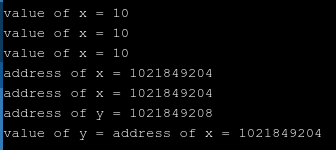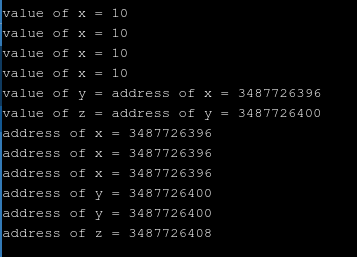Pointer
To point the address of the value stored anywhere in the computer memory, a pointer is used. Dereferencing the pointer is to obtain the value stored at the location. The performance for a repetitive process is improved by the pointer. Such processes include:
- Traversing String
- Lookup Tables
- Control Tables
- Tree Structures
Pointer Details:
- Pointer arithmetic: In pointers, four arithmetic operators can be used: ++, –, +, -.
- The array of pointers: An array can be defined to hold several pointers.
- Pointer to pointer: We can have a pointer on a pointer and so on in C.
- Passing pointers to functions in C: To enable the passed argument to be changed in the calling function by the called function, we can pass an argument by reference or by address.
- Return pointer from functions in C: In C, a function can also return a pointer to the local variable, static variable, and dynamically allocated memory.
Pointer Example:
#include <stdio.h> int main( ) { int x = 10; int *y; y = &x; printf ("value of x = %d\n", x); printf ("value of x = %d\n", *(&x)); printf ("value of x = %d\n", *y); printf ("address of x = %u\n", &x); printf ("address of x = %d\n", y); printf ("address of y = %u\n", &y); printf ("value of y = address of x = %u", y); return 0; } |
Output:

Pointer to Pointer Example:
#include <stdio.h> int main( ) { int x = 10; int *y; int **z; y = &x; z = &y; printf ("value of x = %d\n", x); printf ("value of x = %d\n", *(&x)); printf ("value of x = %d\n", *y); printf ("value of x = %d\n", **z); printf ("value of y = address of x = %u\n", y); printf ("value of z = address of y = %u\n", z); printf ("address of x = %u\n", &x); printf ("address of x = %u\n", y); printf ("address of x = %u\n", *z); printf ("address of y = %u\n", &y); printf ("address of y = %u\n", z); printf ("address of z = %u\n", &z); return 0; } |
Output:

